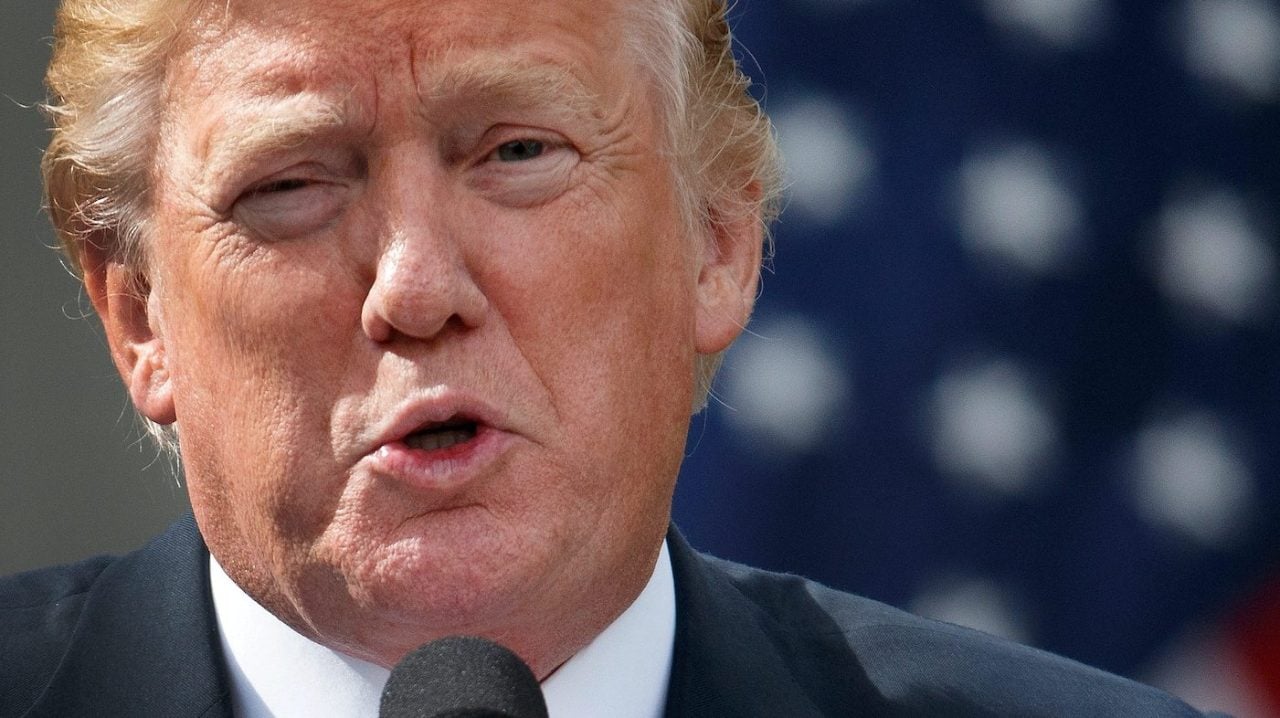Tax cuts and pandemic relief measures enacted during the Trump administration added $8.4 trillion to the national debt over the 10-year budget window, according to a study released Wednesday by a top budget watchdog group.
Discretionary spending increases from 2018 and 2019 added $2.1 trillion, Trump’s signature Tax Cuts and Jobs Act added $1.9 trillion and the 2020 bipartisan CARES Act for pandemic relief added another $1.9 trillion, the Committee for a Responsible Federal Budget (CRFB), a Washington think tank, found in a study released earlier this month.
“Of the $8.4 trillion President Trump added to the debt, $3.6 trillion came from COVID relief laws and executive orders, $2.5 trillion from tax cut laws, and $2.3 trillion from spending increases, with the remaining executive orders having costs and savings that largely offset each other,” budget experts with the CRFB wrote in a summary of the report.
The only significant deficit reduction enacted by the Trump administration noted in the report was due to tariffs levied on a variety of imported goods, which are calculated to have brought in $445 billion over 10 years.



For the record, government debt isn’t bad. What is bad, is how that debt is used. If you use it to fund productivity boosting infrastructure projects, then it pays for itself. If you use it to invest in successful companies in return for shares then it pays for itself… unlike when Tesla got a $400 million gov. loan and gave nothing in return - which meant tax payers had to take the hit when Solyndra (which got money from the same scheme) bankrupted itself into the toilet, tax payers took all the risk and got shafted both when a company failed and when one succeeded.
The Norwegian government, for example, owns 30% of the domestic stock market. One of many strategies the US government should probably be looking to if they want a healthier way to invest in companies.
Using debt to back tax cuts on the other hand, like Trump did according to this article, is an awful strategy.
I’d say adding 8.4 trillion to the debt is pretty freaking awful. That’s 24% of today’s national debt.
You clearly either didn’t read or didn’t understand the comment you’re replying to.
Let me dumb it down for you some more
A government incurring debt isn’t inherently bad. That’s a (hypocritical) conservative talking point.
A government incurring debt to pay for tax cuts for the rich like Trump did is extremely bad and stupid.
A government incurring debt isn’t inherently bad, but I have a hard time imagining a sustainable and effective way to rake up an 8.4 trillion debt in four years.
In a word: infrastructure. In two words for accuracy: PUBLIC infrastructure.
I’m all for massive public infrastructure spending, but I’d rather tax billionaires and corporations than incur trillions in debt.
Of course, I’d still rather be in debt for infrastructure spending than for tax cuts.
We’re in full agreement then 🙂
Taxes don’t fund spending tho. Taxing billionaires should be about just taking money away from them.
Taxes actually have two purposes, guaranteeing money circulates and is legitimate, and removing money from the economy. That’s it basically. With the caveat that local taxes do fund spending many times, like for school budgets etc.
But all federal spending is completely decoupled from taxes. The government just “prints” the money. They actually digitally credit certain accounts with the money, but it’s the same shit.
Like if the government passes a budget of 1 billion for infrastructure, they will literally just change some numbers in “key strategic accounts”, like big banks, government agencies, ministries etc. That money doesn’t come from anywhere, it’s literally created out of thin air.
And if all that new money is absorbed by productive forces, there is 0 inflation. Only if the money is absorbed by unproductive forces that inflation happens. Like the money just going to rich people’s pockets, there will be inflation. Cause they will just buy more and more assets, without any new assets being created by the “new money”. And well, more demand for the same amount of goods is inflation.
What kinda nonsense claim is that?? Of COURSE they do!
More absolute nonsense. Taxes are paying your part to live in a civilized society. Public programs, which are PART of the overall economy, are an example of what taxes do.
Of the dozens of times you were dropped on your head as a child, how many would you say were intentional?
Like 99% of all money
That’s not how money, absorption, production or inflation works
That’s not it either. The majority of inflation is greedflation.
deleted by creator
Bro go read a modern macroeconomics book. What are you on? You’re literally like 200 years behind the entire fucking field. Not even the most orthodox economists would agree with you.
All I said was based on Keynesian theory and MMT. Y’know, two of the major theories, which are the most accepted around the world among economists.
And again, I did say local taxes do fund spending. But taxes definitely, 100%, don’t fund federal spending of nations who have sovereign currencies. Sure, El Salvador can’t just print money for their budget, but the US, China, Brazil, Japan etc. all can.
You clearly didn’t catch my point either.
Trump added 8.4 trillion to the debt- which is 24% of the current national debt.
While I’m not arguing that debt is necessarily bad…. that much added debt is bad.
I DID catch that, but you’re wrong on that one point.
Using your own example, spending even THAT much on repairing the crumbling infrastructure and building new and better PUBLIC systems would pay for itself many times over.
Of course, funding it by raising taxes on the richest people and corporations as well as closing tax avoidance loopholes would be the best way to go about it, but even if you just added it to the debt at first, it would be a great investment.
It’s the nation-state equivalent of putting it on a credit card. You’re not thinking about it across the life of the debt.
They’re not going to raise taxes to pay it off, and they will barely be paying more than the interest we already do have.
If we weren’t already massively in debt…and had a reasonable belief the debt would be payed off in anything resembling a reasonable time line… then you’d be right.
I’d love to be living in that fantasy land. But we haven’t since I’ve been aware enough to know what “budgeting” is.
My proverbial grandchildren of grandchildren will be paying interest on that 8.4 trillion. And every other infrastructure package and war and tax break we feel we need between now and when they die.
No. Spending on much-needed infrastructure isn’t a zero sum expenditure. It’s an investment that invariably returns several times the money invested by helping all of society but especially those at the bottom who needs it the most and whose poverty and resulting decrease in ability to afford goods and services is hampering the economy second most of all factors (after the mega-rich hoarding the majority of all wealth and income, of course).
There would be no need to since it would be the best and most lucrative (for the people in general rather than a few billionaires and their corporations) investment that the US government ever made.
The government is funded by one of two ways- collected through taxes, or through debt. The debt is specifically in the form of treasury bonds, which is a loan paid back over time. the current bond yields for 20 and 30 year bonds are 4.75%.
we’ve been living on debt for years. Decades. Most years, for longer than I’ve been alive, we’ve been functioning off debt. Some of that is unavoidable- when responding to emergencies like COVID or hurricanes or fires… it’s prudent to use that card. But only if one pays off that debt in the relatively near term.
Infrastructure spending is necessary, but it doesn’t directly increase revenue. It does support economic activity, but in the US that is almost all private companies, meaning the only “gains” to US government revenue is through … taxes.
Which means, If we’re not paying more in taxes, then you’re flat wrong about “it paying for itself.”. Oh, and by the way. total revenue has been rather flat comprred to GDP since 2015.
Further more, Interest payment on debt is not something you can take out more debt for. So the solution to sustain long-term deficits like what the US has; is to put everything else on more debt. As you increase the amount of debt (34.1 trillion at the moment), that means, for a given tax revenue, the more we will have to continue using debt.
Dumping 8.4 trillion dollars of spending that we’ve known is needed for decades is bad. It increases our debt burden for generations, the effects of which means increasingly more debt. and the longer we keep having a deficit for things that we know need to be paid… the harder it’s going to be reverse, and the fewer services the US government can provide it’s citizens.
You can make arguments and justifications all you want. The reality is, sustaining a long term deficit is bad, and if it continues, it will eventually lead to the collapse of the US.
Which in turn increases revenue
Perhaps I wasn’t being clear enough. By PUBLIC infrastructure I meant that it would be a government project through and through. No “private-public partnership” bullshit. The government is responsible from top to bottom and as such, none of the trillions of dollars go to shareholders and other rich people skimming off the top.
It would be the biggest public works program since the New Deal, if not even bigger than the New Deal public works programs that were THE most important part of saving the economy from the havoc wrought by the rich and irresponsible back then and it can be again.
As for the rest of your comment, that’s going to be irrelevant with the enormous increase in economic activity and resulting tax revenue to bring DOWN the debt.
Also, I’m not saying not to raise taxes on those who aren’t paying their fair share. It’s possible to walk and chew bubble gum at the same time. I’m just saying that even IF there’s a hypothetical scenario where raising taxes is for some reason not possible, the kind of projects I have in mind would STILL turn a profit from the initial 8.4t investment since all of it is invested right into the tax base and their ability to participate in the economy.
Tax payers took no risk, taking risk implies having an option. Tax payers were forcibly handed the debt burden with no vote. American citizens are the ones who pay the price of the failures of the wealthy. American workers who keep our society functioning are robbed on a daily basis, we should have never taxed income.
The loan program that gave money to solyndra had like a 2% default rate. For anyone concerned about climate and switching to green energy, it was a big success. Implying it was some big failure based on what appears to be a well calculated risk, is unfair and just pushing the propaganda spread by parties who don’t want the government to do anything to save the environment.
Another big thing is to understand that the interest on the debt is typically lower than inflation, so deficit spending is actually cheaper than paying cash for everything.
I’m confused…the government does own a bunch of stocks and makes a good return on them. Granted it’s the portfolio of individual congress members, does that not count?